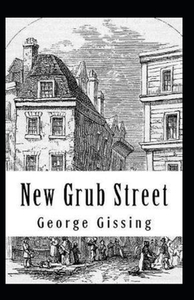Take a photo of a barcode or cover
I struggled with this book a little at first, especially when I had a hard time liking some of the main characters. Most of the men in the book were quite unpleasant or even despicable in some way, whereas the women seemed more interesting to me, as they struggled to be independent of and respected by the men in their lives.
The story focuses on a number of people with some connection to writing or publishing in some form. Some of them are struggling to do good work, while others just want to gain some notoriety. I found some of the "industry" issues interesting, as a few might as well be happening today (the idea of writing shorter, easier to read pieces for a less attentive audience, for example).
I did have a hard time seeing this as happening in the 1880s though, mainly because the writing style seemed a little more modern to me, at least compared to other works from this time. I kept thinking they were in the 1900s at the very least, or perhaps a little later. I also kept making comparisons between some of the characters and those in The Forsyte Chronicles (Alfred Yule and Soames Forsyte, Jasper Milvain and Michael Mont, etc.).
The writing style, although it felt a little more modern, was a bit of a slog at points. The dialogue between certain characters felt extremely formal and overdone, and not enough like natural language. And some of the philosophical tangents were a bit dull and heavy-handed.
Overall, I thought it was an interesting, albeit not very uplifting or happy, book, but I didn't really enjoy it as much as I'd hoped to. But I think I'll still look into some of Gissing's other books, after this initial introduction.
The story focuses on a number of people with some connection to writing or publishing in some form. Some of them are struggling to do good work, while others just want to gain some notoriety. I found some of the "industry" issues interesting, as a few might as well be happening today (the idea of writing shorter, easier to read pieces for a less attentive audience, for example).
I did have a hard time seeing this as happening in the 1880s though, mainly because the writing style seemed a little more modern to me, at least compared to other works from this time. I kept thinking they were in the 1900s at the very least, or perhaps a little later. I also kept making comparisons between some of the characters and those in The Forsyte Chronicles (Alfred Yule and Soames Forsyte, Jasper Milvain and Michael Mont, etc.).
The writing style, although it felt a little more modern, was a bit of a slog at points. The dialogue between certain characters felt extremely formal and overdone, and not enough like natural language. And some of the philosophical tangents were a bit dull and heavy-handed.
Overall, I thought it was an interesting, albeit not very uplifting or happy, book, but I didn't really enjoy it as much as I'd hoped to. But I think I'll still look into some of Gissing's other books, after this initial introduction.
This novel is centred upon the struggles of literary men especially Edwin Reardon and Jasper Milvain. Edwin Reardon is a married man and is feeling the pressure to write in such a pace to support his family. His future does not look promising nor does his wife looks at him the way he used to remember her to. Jasper Milvain is young and ambitious. Whilst he’s not in such a financial strait, he cannot afford to marry without sufficient dowry yet temptation may prove too great for him to resist.
”...a broad, flabby face, the colour of an ancient turnip, save where one of the cheeks was marked with a mulberry stain; ... for moustache, what looked like a bit of discoloured tow, and scraps of similar material hanging beneath his creasy chin represented a beard. His garb must have seen a great deal of Museum service;...his linen made distinct appeal to the laundress.”
I didn’t expect to like this novel as much as I did. It is actually a rather sad novel as these characters struggle with poverty and the effects of such penury have on people and relationships. I find author’s descriptions to be both amusing and depressing.
”Love is one of the first things to be frightened away by poverty.”
There was also the reflection of mismatches in marriages and there were a few in this book. It wasn’t just the absence of money but also of intellect and a little of ‘class’ (though this last point is rather about the lack of education than anything else, I think). Though most characters seem to have deserved their ends in this book, there is one whom I have wished more for.
“It has been repeated often enough that vice leads to misery; will no man declare that misery leads to vice?”
One would wish to believe that strength of character surely will prevail and the romantics (me, for one) would also wish to believe that love prevails over all. The practical side of me knows however that this is just not realistic. The poignancy of this novel really touched me (I even broke down & cried at one point) but it was overall a very enjoyable read and still relevant in today’s world.
”...a broad, flabby face, the colour of an ancient turnip, save where one of the cheeks was marked with a mulberry stain; ... for moustache, what looked like a bit of discoloured tow, and scraps of similar material hanging beneath his creasy chin represented a beard. His garb must have seen a great deal of Museum service;...his linen made distinct appeal to the laundress.”
I didn’t expect to like this novel as much as I did. It is actually a rather sad novel as these characters struggle with poverty and the effects of such penury have on people and relationships. I find author’s descriptions to be both amusing and depressing.
”Love is one of the first things to be frightened away by poverty.”
There was also the reflection of mismatches in marriages and there were a few in this book. It wasn’t just the absence of money but also of intellect and a little of ‘class’ (though this last point is rather about the lack of education than anything else, I think). Though most characters seem to have deserved their ends in this book, there is one whom I have wished more for.
“It has been repeated often enough that vice leads to misery; will no man declare that misery leads to vice?”
One would wish to believe that strength of character surely will prevail and the romantics (me, for one) would also wish to believe that love prevails over all. The practical side of me knows however that this is just not realistic. The poignancy of this novel really touched me (I even broke down & cried at one point) but it was overall a very enjoyable read and still relevant in today’s world.
3.5. Wow what a cynical ending! I'm not sure what to make of that, yet again Gissing writes plots like nothing I would expect from this time period.
Despite having read a lot of Victorian literature, this is my first experience of Gissing and I can see why he is not the most prominent author from this period. While some of the sections of the novel are good, the plot is unevenly paced, with most of the main turning points coming in the third volume. However, it does give an interesting insight into the precariousness of a literary man's life and the difficulty of sacrificing artistic integrity for a commercial sake.
challenging
reflective
sad
slow-paced
Plot or Character Driven:
Character
Loveable characters:
No
Flaws of characters a main focus:
Yes
One of the most delightful, intelligent and readable novels I have read in ages.
Let's just say it was completely okay for a classic. Didn't hate it, didn't love it. Giving it two stars, but 2.5 would be a better choice. And not to sound like a librivox advertisement, but I could not have gotten through this book without it.
This is more like 3.75 stars but I just can't merit the 4.
This certainly wasn't terrible. The characters were memorable. The scenes with Edwin Reardon struggling,and Biffen towards the very end were beautiful and poetic, if heart-wrenchingly relatable for any person who has ever had to really discipline themselves to finish a written task, or to just continue on when everything appears grey. Additionally, Reardon's lament to Biffen on his death-bed about now never going to Greece together strikes tremors into my heart whenever I think back to it. How terribly sad. .
The negatives (obviously, in my personal opinion) was that there seemed way too much dialogue; not enough plot (and what there was, remained overly straightforward); and a somewhat flimsy conclusion. The extremely modern language, considering the era of the text's publication, I often felt somewhat degraded potential moral messages and the conflict into slightly too hyper-realist and literal interpretations. Basically, hand me the symbolic novels over this, but it definitely isn't the worst: I just prefer novels with more show and less tell.
This certainly wasn't terrible. The characters were memorable. The scenes with Edwin Reardon struggling,
The negatives (obviously, in my personal opinion) was that there seemed way too much dialogue; not enough plot (and what there was, remained overly straightforward); and a somewhat flimsy conclusion. The extremely modern language, considering the era of the text's publication, I often felt somewhat degraded potential moral messages and the conflict into slightly too hyper-realist and literal interpretations. Basically, hand me the symbolic novels over this, but it definitely isn't the worst: I just prefer novels with more show and less tell.
Ostensibly a story of authors and writing, this (partly autobiographical) novel is, at its core, a study of poverty and its impact on relationships and personal well-being. And it does it so well: move over Dickens, this man is up there with the best - also, he is not averse to adding a few drops of melodrama every now and then to spice things up. A great read by an author I'm only sorry that I've ignored for so long.



